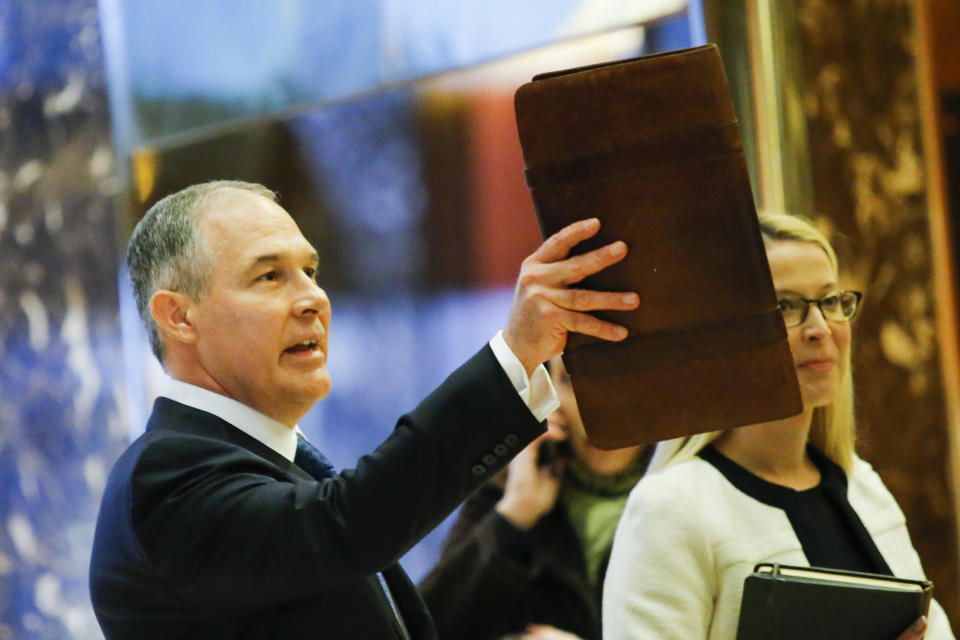Experts Press Feds To Eradicate Lead Poisoning By 2021
In just five years, the U.S. could end the problem of lead poisoning, a group of health experts argues ― if federal overseers are given more ammunition to attack the problem despite an administration that wants to gut regulations.
A coalition of scientists, doctors and children’s health advocates published an opinion piece in the Journal of the American Medical Association Pediatrics on Monday that calls on the government to stamp out lead poisoning in American children by 2021 ― or ensure no child has a blood lead level greater than 5 micrograms per deciliter ― and eliminate lead exposure altogether by 2030.
Project TENDR (Targeting Environmental Neurodevelopmental Risks) advocates for reducing exposure levels to chemicals and pollutants that contribute to neurodevelopmental problems, such as attention deficit hyperactivity disorder (ADHD).
Lead contamination of the drinking water in Flint, Michigan, which caused a rise in the number of the city’s children who had lead poisoning, drew public attention to the problem in 2014. But lead exposure affects communities across the country. The U.S. Environmental Protection Agency, which enforces lead restrictions, estimates 6.5 million to 10 million homes are connected to lead service lines.
Nearly 3,000 areas in the U.S. have higher lead poisoning rates than Flint, according to a Reuters investigation. Exposure to peeling paint in older homes is the biggest source of lead poisoning, disproportionately affecting low-income families.
Forty years ago, 88 percent of young children in the U.S. had elevated levels of lead in their blood. Today, just 2.5 percent of kids ages 1 to 5 have lead levels above the now-lower threshold set by the Centers for Disease Control and Prevention in 2012. (The threshold had been 10 micrograms.) But lead is a neurotoxin that isn’t safe in any quantity. It’s particularly toxic for young children, increasing their risk of brain and nervous system damage.
“Lead is one of those things that people tend to get lulled into a sense that ‘we’ve already dealt with the issue, we took it out of gasoline and regulated the amount in paint,’” said David Bellinger, lead author of Monday’s article and an environmental health professor at Harvard University.
“It took something like Flint for people to realize that there’s just enormous reservoirs of lead out there in the environment … and that all it takes is some human error or some engineering failure and the problem resurfaces,” Bellinger said.

Bellinger said the drastic reduction in lead exposure since the late 1970s shows how effective regulations have been, but he said that the EPA and other federal agencies need to strengthen their lead restrictions ― which cover drinking water, paint, air quality, soil, dust and other sources ― to keep up with current research.
Project TENDR also calls for dedicated funding for more programs that actively eliminate sources of lead. They say the government needs to put a complete ban on the use of lead in products including aviation fuel, cosmetics, wheel weights, industrial paints, batteries and lubricants.
Its call for stronger lead rules could be a tall order under the current administration. President Donald Trump has signed executive orders to slash regulations and proposed gutting the EPA’s budget, including its lead paint programs.
To carry out the president’s directions, the EPA is accepting public comments through Monday on regulations it could repeal.
In East Chicago, Indiana, which is undergoing a lead crisis at a public housing complex built on the site of a former lead refinery, several organizations wrote a letter published by the Northwest Indiana Times that urged the agency to strengthen, not reduce, its lead regulations.
Repealing lead regulations or defunding prevention programs would “perpetuate a completely preventable public health crisis,” the groups wrote on behalf of residents at the East Chicago complex, designated an EPA Superfund cleanup site.
The EPA has been looking at updating its lead rules for a couple of years, including possibly requiring cities to replace all lead pipes, one of the goals of Project TENDR. But the agency acknowledges it would be an enormously difficult and expensive undertaking ― Flint received tens of millions of dollars from the EPA and the state of Michigan to replace its lead service lines, and nationwide pipe replacement would cost more than $16 billion.
“It’s going to make the work harder to fight back against the rising tide,” Bellinger said of Trump’s anti-regulation crusade. “So we just have to work with our representatives, our senators, and make sure that these issues don’t get pushed aside and that at least Congress is trying to keep a focus on them.”
Also on HuffPost
He has threatened to undermine protections for air and water.

Since taking office as Oklahoma’s attorney general in 2011, Pruitt has sued the Environmental Protection Agency on multiple occasions in an effort to overturn rules limiting air pollution from power plants -- including the Cross-State Air Pollution Rule, which curbs power plant emissions of sulfur dioxide and nitrogen oxides, and the Mercury and Air Toxics Standards, which place limits on the amount of mercury, arsenic and other toxic pollution.
As Elliott Negin, a senior writer at the Union of Concerned Scientists, explained in January, those are both life-saving regulations: “Taken together, they are projected to prevent 18,000 to 46,000 premature deaths across the country and save $150 billion to $380 billion in health care costs annually. In Pruitt’s home state, the two regulations would avert as many as 720 premature deaths and save as much as $5.9 billion per year.”
Pruitt sued the EPA in 2015 over the Waters of the United States rule -- which, in a piece co-written with Sen. Rand Paul (R-Ky.), he called the “greatest blow to private property rights the modern era has seen.” The rule, which is currently tied up in the courts, extends EPA protection to tens of millions of acres of wetlands and millions of miles of streams, including those that 1 in 3 Americans rely on for drinking water.
Pruitt also sued the EPA over its 2015 regulation strengthening the national health standards for ground-level ozone or smog pollution.
Several of these lawsuits are still ongoing, and environmental advocates have called on Pruitt to recuse himself from decisions related to the regulations he’s challenged in court. Legal experts told Bloomberg, however, that they knew of no rules in place that would compel such an action on Pruitt’s part.
“Every American should be appalled that President-elect Trump just picked someone who has made a career of being a vocal defender for polluters to head our Environmental Protection Agency,” Trip Van Noppen, president of Earthjustice, said in a December 2016 statement. “He has fought Environmental Protection Agency pollution limits on toxic substances like soot and mercury that put us all at risk for increased cancer, childhood asthma and other health problems. He falsely claims that fracking doesn’t contaminate drinking water supplies.”
He doesn’t think the EPA is the “nation’s foremost environmental regulator.”

“The states,” he said, “were to have regulatory primacy.”
As Oklahoma’s attorney general, Pruitt created a “federalism unit” with the specific aim of opposing federal protections and safeguards, including the Affordable Care Act and environmental regulations.
Under Pruitt, the EPA will likely witness “an increasing effort to delegate environmental regulations away from the federal government and towards the states,” Ronald Keith Gaddie, a professor of political science at the University of Oklahoma, told The New York Times.
Though states may be best equipped to regulate certain industries, some experts have stressed that environmental protection is one area that needs more federal oversight.
“Pollution doesn’t respect state boundaries,” Patrick A. Parenteau, a professor of environmental law at Vermont Law School, told the Times. “States have limited ability to regulate pollution from outside the state, and almost every state is downstream or downwind from other pollution.”
He doesn’t believe in climate change.

“Climate change is happening,” the agency said on its website, adding that the EPA is “taking a number of common-sense steps to address the challenge” of warming, such as developing emissions reduction initiatives and contributing to “world-class climate research.”
Pruitt, like most of Trump’s Cabinet picks, is a climate change denier. Ignoring the overwhelming scientific consensus on the matter, Pruitt wrote last year that the debate on climate change is “far from settled.”
Gina McCarthy, the previous EPA chief, warned in November that denying the facts about climate change would undermine the United States' success both domestically and internationally. Other countries “are wondering if the U.S. will turn its back on science and be left behind,” she said.
“The train to a global clean-energy future has already left the station,” McCarthy added. “We can choose to get on board — to lead — or we can choose to be left behind, to stand stubbornly still. If we stubbornly deny the science and change around us, we will fall victim to our own paralysis.”
He’s a close ally of the fossil fuel industry ...
![… and their relationship has observers deeply concerned.<br /><br />Since 2002, Pruitt has received <a href="https://www.theguardian.com/us-news/2016/dec/08/scott-pruitt-trump-administration-epa-oil-gas-environment" target="_blank">more than $300,000</a> in contributions from the fossil fuel industry, including from political action committees connected to Exxon Mobil, Spectra Energy and Koch Industries. The New York Times reported in 2014 that he and other Republican attorneys general had formed an “<a href="https://www.nytimes.com/2014/12/07/us/politics/energy-firms-in-secretive-alliance-with-attorneys-general.html" target="_blank">unprecedented, secretive alliance</a>” with major oil and gas companies to undermine environmental regulations. One of the firms, Oklahoma’s Devon Energy,<strong> </strong>drafted a letter for Pruitt to send to the EPA in 2011. Pruitt <a href="http://www.sierraclub.org/sierra/green-life/meet-scott-pruitt-man-picked-lead-epa" target="_blank">printed the document on state letterhead</a> and sent it off, almost verbatim, to Washington.<br /><br />As attorney general, Pruitt also filed several lawsuits with industry players, including Oklahoma Gas and Electric and the Domestic Energy Producers Alliance, a nonprofit group backed by major oil and gas executives. In May 2016, Pruitt joined then-Alabama Attorney General Luther Strange in writing an opinion piece defending Exxon Mobil and other energy groups, after the oil giant <a href="https://www.bloomberg.com/news/articles/2016-03-30/oklahoma-alabama-support-exxon-mobil-in-ny-led-climate-probe" target="_blank">came under scrutiny</a> for allegedly failing to disclose its internal research on climate change.<br /><br />The Times asked Pruitt in 2014 whether he’d been wrong to send letters to the federal government written by industry lobbyists, or to side with them in litigation. Pruitt was unapologetic. <br /><br />“The A.G.’s office seeks input from the energy industry to determine real-life harm stemming from proposed federal regulations or actions,” his office said in a statement. “It is the content of the request not the source of the request that is relevant.”<br /><br />Opponents, however, say Pruitt is a <a href="http://www.politico.com/blogs/donald-trump-administration/2016/12/oklahoma-ag-pruitt-epa-chief-232319" target="_blank">Big Oil ally</a> — someone who, as EPA administrator, could <a href="https://www.desmogblog.com/2017/01/13/mapping-epa-nominee-scott-pruitt-many-fossil-fuel-ties" target="_blank">prioritize industry interests</a> over the health of the environment and the American people.<br /><br />“This is a frightening moment,” Harvard University professor Naomi Oreskes said at a rally <a href="https://eos.org/articles/fearful-of-trump-hundreds-in-san-francisco-rally-for-science">in December</a>, referring to Trump's Cabinet picks. “We have seen in the last few weeks how the reins of the federal government are being handed over to the fossil fuel industry.”<br /><br />“From denying settled climate science to leading the opposition of EPA’s Clean Power Plan, Pruitt has sent a loud and clear message to Big Oil and its well-funded mouthpieces that <a href="http://www.motherjones.com/environment/2017/01/climate-deniers-coming-next-epa-chief-rescue" target="_blank">he’s their guy</a>,” said Sen. Sheldon Whitehouse (D-R.I.), who is one of the senators calling for Pruitt to disclose more details on his connection to some oil-funded groups, according to Mother Jones. “To put a climate denier at the helm of an agency working to keep our environment safe is as dangerous as it gets.” <br /><br />Sen. Bernie Sanders (I-Vt.), a member of the Senate Environment and Public Works Committee, echoed similar concerns: “The American people must demand leaders who are willing to transform our energy system away from fossil fuels. I will <a href="https://thinkprogress.org/pruitt-epa-confirmation-fight-preview-400e8a68ffc2#.ca0qfw6f4" target="_blank">vigorously oppose this nomination</a>.”<br /><br />It’s not just Pruitt’s fossil fuel connections that have raised eyebrows. A recent <a href="http://www.ewg.org/research/ewg-investigates-scott-pruitt-and-poultry-pollution" target="_blank" data-beacon="{"p":{"mnid":"entry_text","lnid":"citation","mpid":1,"plid":"http://www.ewg.org/research/ewg-investigates-scott-pruitt-and-poultry-pollution"}}">Environmental Working Group investigation</a> found that Pruitt gave a <a href="http://www.huffingtonpost.com/entry/scott-pruitt-poultry-contributions-lawsuit_us_587960bae4b0e58057fee7bd">regulatory pass to polluters from the poultry industry</a> after receiving $40,000 in campaign donations from executives and lawyers representing poultry companies. <br /><br />“Very clearly, this is someone coming in [to lead the EPA] with an ideology to deregulate at whatever government level he finds himself,” Cook, the EWG head, <a href="http://www.huffingtonpost.com/entry/scott-pruitt-poultry-contributions-lawsuit_us_587960bae4b0e58057fee7bd">told The Huffington Post</a>. “There’s no saying that ‘we just have a different philosophy’ about who should enforce environmental law. The philosophy, if it exists, is that environmental policy shouldn’t be enforced at a state or federal level. It is industry unrestrained.”](https://s.yimg.com/ny/api/res/1.2/QHwf0rgUeS5o401raGlSXA--/YXBwaWQ9aGlnaGxhbmRlcjt3PTk2MA--/https://img.huffingtonpost.com/asset/587dc4731700002e00fdf034.jpg)
Since 2002, Pruitt has received more than $300,000 in contributions from the fossil fuel industry, including from political action committees connected to Exxon Mobil, Spectra Energy and Koch Industries. The New York Times reported in 2014 that he and other Republican attorneys general had formed an “unprecedented, secretive alliance” with major oil and gas companies to undermine environmental regulations. One of the firms, Oklahoma’s Devon Energy, drafted a letter for Pruitt to send to the EPA in 2011. Pruitt printed the document on state letterhead and sent it off, almost verbatim, to Washington.
As attorney general, Pruitt also filed several lawsuits with industry players, including Oklahoma Gas and Electric and the Domestic Energy Producers Alliance, a nonprofit group backed by major oil and gas executives. In May 2016, Pruitt joined then-Alabama Attorney General Luther Strange in writing an opinion piece defending Exxon Mobil and other energy groups, after the oil giant came under scrutiny for allegedly failing to disclose its internal research on climate change.
The Times asked Pruitt in 2014 whether he’d been wrong to send letters to the federal government written by industry lobbyists, or to side with them in litigation. Pruitt was unapologetic.
“The A.G.’s office seeks input from the energy industry to determine real-life harm stemming from proposed federal regulations or actions,” his office said in a statement. “It is the content of the request not the source of the request that is relevant.”
Opponents, however, say Pruitt is a Big Oil ally — someone who, as EPA administrator, could prioritize industry interests over the health of the environment and the American people.
“This is a frightening moment,” Harvard University professor Naomi Oreskes said at a rally in December, referring to Trump's Cabinet picks. “We have seen in the last few weeks how the reins of the federal government are being handed over to the fossil fuel industry.”
“From denying settled climate science to leading the opposition of EPA’s Clean Power Plan, Pruitt has sent a loud and clear message to Big Oil and its well-funded mouthpieces that he’s their guy,” said Sen. Sheldon Whitehouse (D-R.I.), who is one of the senators calling for Pruitt to disclose more details on his connection to some oil-funded groups, according to Mother Jones. “To put a climate denier at the helm of an agency working to keep our environment safe is as dangerous as it gets.”
Sen. Bernie Sanders (I-Vt.), a member of the Senate Environment and Public Works Committee, echoed similar concerns: “The American people must demand leaders who are willing to transform our energy system away from fossil fuels. I will vigorously oppose this nomination.”
It’s not just Pruitt’s fossil fuel connections that have raised eyebrows. A recent Environmental Working Group investigation found that Pruitt gave a regulatory pass to polluters from the poultry industry after receiving $40,000 in campaign donations from executives and lawyers representing poultry companies.
“Very clearly, this is someone coming in [to lead the EPA] with an ideology to deregulate at whatever government level he finds himself,” Cook, the EWG head, told The Huffington Post. “There’s no saying that ‘we just have a different philosophy’ about who should enforce environmental law. The philosophy, if it exists, is that environmental policy shouldn’t be enforced at a state or federal level. It is industry unrestrained.”
Love HuffPost? Become a founding member of HuffPost Plus today.
This article originally appeared on HuffPost.

